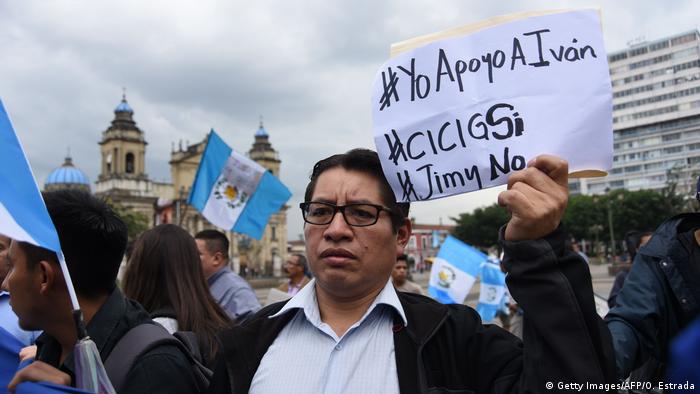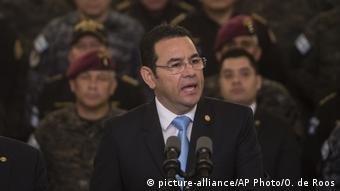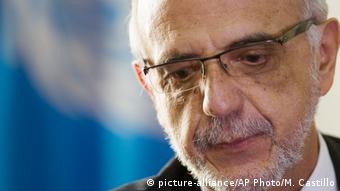The conflict to the head of the International Commission against impunity in Guatemala is escalating. The government wants to deny him entry – and defies a ruling of the constitutional court.

Protesters in support of CICIG chief Iván Velásquez
The Guatemalan government of President Jimmy Morales has summoned a serious state of crisis: For weeks they denied the head of the International Commission against impunity in Guatemala (CICIG) to enter Guatemala. Iván Velásquez is currently on a business trip in New York. That he is not allowed into the country, is done according to the official statement, “for reasons of order and public security”. Even a ruling by the Guatemalan constitutional court last Sunday, after the entry of Velásquez is to allow is to make the government no consequence. “In order for the Constitution to be put to proper order in the country in question,” says Manfredo marroquin, President, Acción Ciudadana, the local representation of the international NGO Transparency International.
The background to the dispute in order to CICIG, the far-reaching corruption investigation by the authority. It supports for more than ten years – with a mandate from the United Nations, the Guatemalan public Prosecutor’s office. Among other things, she has brought the previous President Otto Pérez Molina to the case. Since the current President, Jimmy Morales and his family pass away due to alleged Corruption have come to the attention of the investigators, has changed this from the CICIG supporters to rigorous opponents – as well as many other politicians and businessmen, which the independence of the authority is a thorn in the eye. “You want me to clean up my Post. In the end, it is important for them is that the CICIG will disappear altogether from Guatemala,” said CICIG chief Iván Velásquez in June in Berlin. The current mandate of the CICIG will run until September 2019. A further extension has rejected President Morales.

Termination of cooperation: President Jimmy Morales does not want to extend the CICIG mandate
Violation of the Constitution
A year ago Velásquez, President Morales persona non grata was declared. A judgment of the constitutional court was able to prevent the expulsion of the CICIG-heads at the time. Now, the Guatemalan government seems to shy away from the open violation of the Constitution. Instead of the entry of Iván Velásquez, to allow as by the constitutional court, has put the Guatemalan government, the United Nations set a deadline of 48 hours, a new CICIG-in-chief to appoint, may then enter into the country. Observers assume that the government seeks only a pretext to refer to the authority of the whole of the country. “You will not get a response to your Ultimatum, and then the contract with the UN, terminate and CICIG throw out,” says Manfredo Marroquín of Acción Ciudadana.
Also, the Guatemalan constitutional court is now required. If the Guatemalan government does not comply with your verdict, you must call the court, the Prosecutor’s office. This could, then, against the politicians of the procedure, the verdict of the constitutional court reflected Whether it comes to other constitutional quarries by the government or the security forces of the country refuse to possibly even to cooperate with the Prosecutor’s office, is still completely open.

UN investigators Iván Velásquez: “you want me to clean up my Post”
Demonstrations against the government
The political crisis of recent weeks has already led to numerous protests across the country, where the protesters of the CICIG to strengthen the back. Three government Ministers have resigned. This Thursday, a General strike is planned. “The people suffering are the government, because the only care about, how you can throw the CICIG from the country, while the country itself collapses completely,” says Marroquín.
What is the course of the crisis in Guatemala takes will also depend on the behaviour of the international community, especially the United States, which co-Finance the CICIG significantly. “Unfortunately, there is U.S. government-very conflicting signals,” says Marroquín. “Support for the CICIG, but at the same time they supported the Guatemalan government in refusing to accept the CICIG.”
Many European governments are concerned about the current Situation. The Foreign office has asked the Guatemalan government to reconsider its decision to not extend CICIG mandate in a year’s time, once again. “It is important now that the EU is expressed with the same clarity as individual European countries,” says Marroquín.